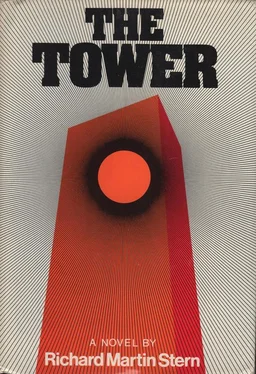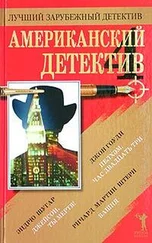Patty was at the desk, pencil and pad at hand, the telephone held to her ear by one hunched shoulder. “A-b-e-l, Abel,” she read back into the phone. “Three twenty-seven North Fiesta Road, Beverly Hills. Next, Governor … ?”
Nat listened to the names as Patty wrote them down and read them back:
“Sir Oliver Brooke—with an e—Ninety-three E-a-t-o-n Square, London South West One.”
That would be the British Ambassador, flown up only this morning from Washington.
“Henry Timms—double m—Club Road, Riverside, Connecticut.”
Head of one of the major networks?
Howard Jones, US Steel … Manuel Lopez y Garcia, Ambassador from Mexico … Hubert van Donck, Shell Oil Company, Amsterdam … Walter Gordon, United States Secretary of Commerce … Leopold Knowski, Ambassador from the USSR…
One name approximately every fifteen seconds. At that rate, it would take half an hour to list them all. Nat picked up the walkie-talkie. “Give us the names as you land them, Chief. We’ll want to know who—may get left.” He walked back to the doorway then and stood looking out at the plaza.
Firemen, police, gaping crowds. The orderly tangle of hoses and the sounds of pumping engines at work. Occasionally the booming voice of a bullhorn. The entire plaza was wet now, a dirty artificial lake. The tormented building still stood, of course, but in a hundred places smoke oozed out to obscure the no longer shining aluminum siding.
“Pretty, huh?” This was Giddings at Nat’s shoulder. His voice was low-pitched, angry. “Circus day. When I was a kid, Fourth of July was a big deal. Fireworks shooting out over the lake at night. People came for miles to watch.” He gestured at the crowds. “Like this.” He paused. “Maybe you can’t blame them, at that.”
Nat turned to look at him.
“They’ve never seen anything like it,” Giddings said. “Neither has anybody else.” He made a sudden angry hand gesture. “That goddamn Simmons.”
“He isn’t the only one.”
“Are you standing up for the son of a bitch?”
“No,” Nat said, “for more reasons than you know.
But,” he added, “neither am I letting the rest of us off the hook.”
“We should have caught it, you mean?” Giddings nodded. “All right. We’ve agreed to that before. But which is worse, doing the dirty or failing to catch it? Answer me that.”
It was a quibble, Nat thought, and found the question unworthy of answer. And yet he could understand Giddings’s need to ask it. A man had to salvage what he could of his self-respect, didn’t he? Didn’t everybody do it every day in many ways—the games people play?
Inside the trailer Patty’s voice said, “Willard Jones, Peter Cooper Village.”
Who was Willard Jones? Or did it matter who he was? It was a name that belonged to a person, now living, maybe soon to be dead. Did he, Nat, accept that now?
Face it, friend, Nat told himself, you have known almost from the beginning how this was going to come out—and he thought of the nineteen bodies in that burned-over mountain clearing.
But for them I had no responsibility.
What difference? The question echoed in his mind.
No one could have anticipated that all electrical power would go out; anybody in his right mind would have said that it was impossible. But so was the grid blackout impossible that had crippled the entire Northeast a few “years back. So were the Titanic sinking and the Hindenburg disaster, the wave of assassinations beginning with President Kennedy’s, and the violence in cities only how many summers ago? Impossible, but they happened.
Logic, he thought suddenly, had nothing to do with it. Logic was for law, for stately considerations of fact, unhurried judgments objectively taken. Logic was not for him.
He, Nat Wilson, was what he felt, the subjective man, not the man with the computer mind. And what he felt was a sense of guilt that would not wash away—ever.
That he had failed to find flaws in the building’s construction could be understood, explained, condoned, forgiven—but not by him. In the entire tangle of this day he was inextricably involved, woven right into the fabric of events even if with some of them he appeared to have no real connection.
He had never laid eyes on the two firemen who had died screaming in the stairwell. Or the other two now in the Tower Room, probably no better off. But he had recommended that they be sent up the long stairs, and even though it had been within Brown’s authority to ignore the suggestion, for Nat a sense of responsibility remained.
He had nothing to do with Bert McGraw’s death. True? False? Logic said one thing, sensibility the other. Because as Zib’s husband he had been insufficient, Zib and Paul had carried on their—thing. And somehow that had figured in McGraw’s heart attack, if Patty understood it at all.
So where did all that leave him?
I am glad you asked that question, sir.
The hell I am.
Am I a jinx?
On the face of it, ridiculous. Involved, yes. Responsible, yes. Were not the two words, the two conditions intertwined? And if I am involved, responsible, then Ben Caldwell must also be drawn into the chain. And he is. He admitted as much in his office only this morning. Grover Frazee? Yes. Bert McGraw? Certainly. The list began to multiply with computer speed, its possibilities almost endless.
Then who was not to a greater or lesser degree involved, responsible? Incredible question, without answer.
He had welcomed Barnes, the black cop, to the lodge of blame. Now Nat thought: welcome yourself to the human race, friend; maybe now you are beginning to see what it is all about. Maybe—
“Nat.” Patty’s soft voice, almost pleading.
He looked down at her sad smile.
“The list is finished,” she said. “Every name. Every address.” She paused. “Somehow just by the act of writing them down, I’m—part of them. Can you see that? I probably don’t know one of them, and yet I know them all. I’m—” She shook her head. “I don’t know what I am.”
“Involved?” Nat said. His tone was gentle. “Responsible?”
The change in her eyes, in her face, was something to see. “You do understand, don’t you? Thank you, Nat.”
“Maybe I’m beginning to,” Nat said.
7:02–7:23
Police Lieutenant Jim Potter sat with his captain and the chief inspector in the large quiet office. Potter had his notebook on his knee. He kept his voice purposely expressionless.
“John Connors,” he said, “Caucasian male, age thirty-four.” He paused. “Widower. No children. Occupation: sheet-metal worker when he worked, which hasn’t been very often recently.” He paused. “A history of mental disturbance commencing three years ago.” He paused again, waiting.
The captain said, “What happened then?”
“His wife died.” Potter’s face was that of a poker player in a big-stakes game: totally expressionless. “She died in jail.” Pause. “In the drunk tank.” Again he waited. The chief inspector said, “She was a lush?”
“She didn’t drink.”
“She was on drugs?”
“Just one.” Potter took his time. “Insulin. She was a diabetic. They picked her up because she had collapsed and was lying on the sidewalk and they thought she was drunk.” He closed the notebook carefully. “So they tossed her into the drunk tank, and without medication she died.”
In the silence the captain said, “Didn’t she carry some kind of identification? Something to say she had diabetes?”
“Maybe.” A little of the sad bitterness showed now in Potter’s voice. “And maybe nobody bothered to look. The investigation after the fact wasn’t very thorough. Connors was the only one who cared much, and he had gone off his rocker.”
Читать дальше










